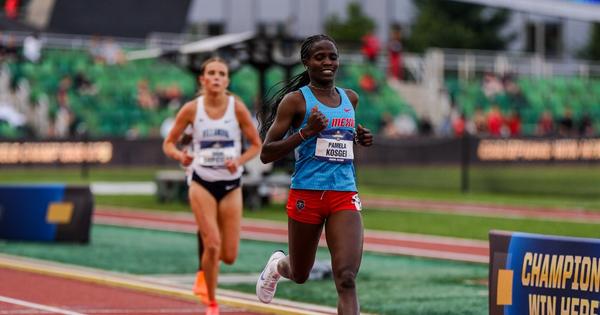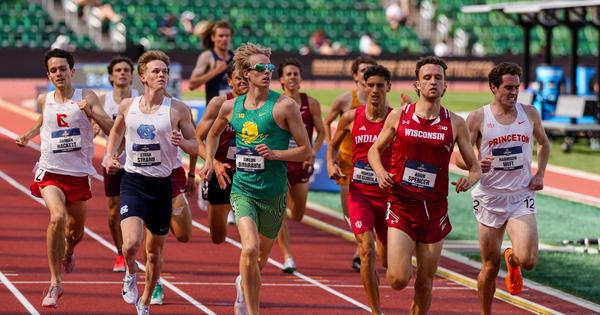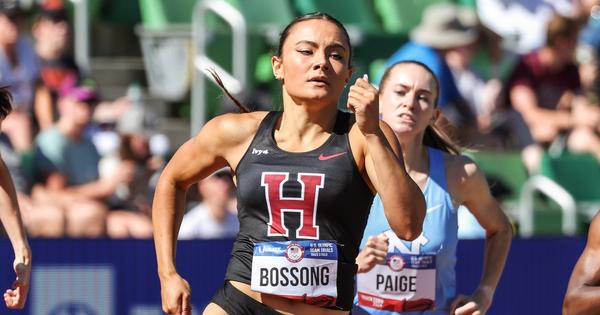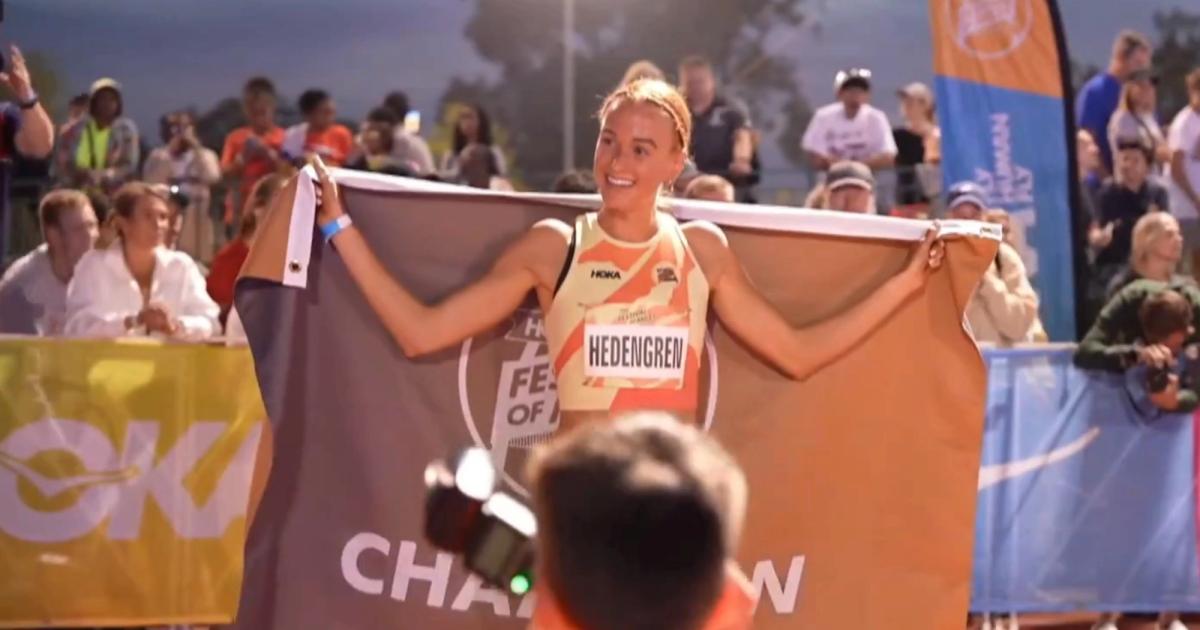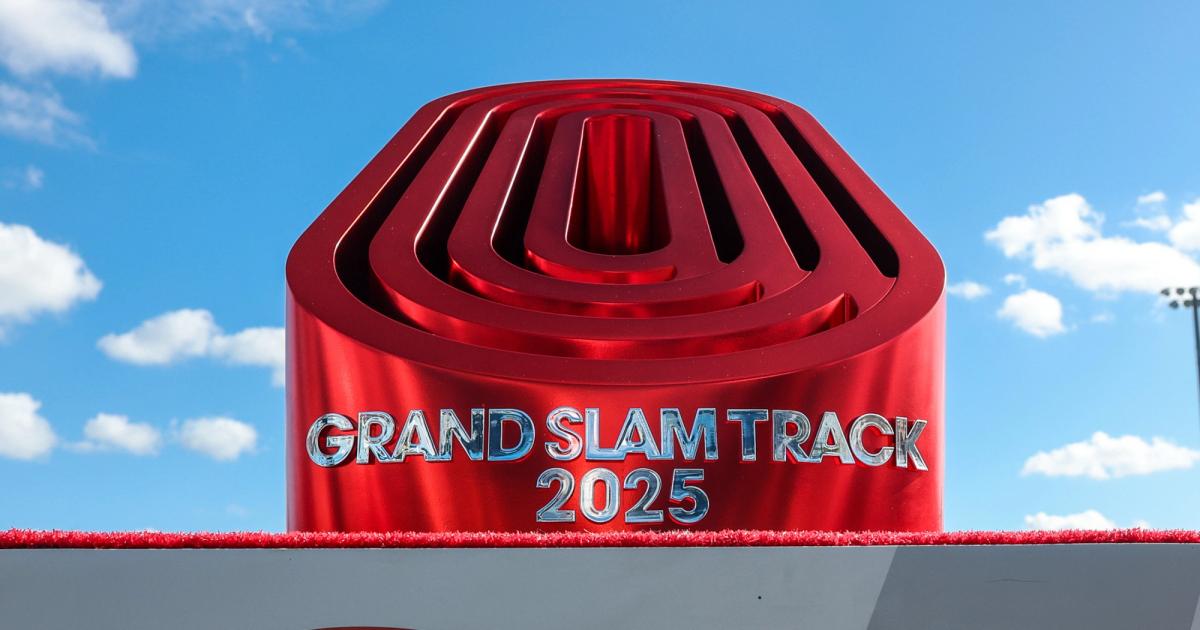By Keenan Baker
June 13, 2025
Yesterday was Day 2 of the NCAA Championships, and Day 1 of the women’s events.
It was windier walking into the stadium and windier in all track and field events. Still perfect weather for this North Carolinian, who expects summer days to have highs in the 90s and humidity in the 60s. We can talk all we want about Hayward Magic, and it could be just the weather (it’s not).
I know I’ve put the self-imposed constraint on myself to write in order of the times the events happen, but spoiler alert: my favorite race of the night came near the very end. I bet you’ll never guess which it was.
9:45am – Decathlon 110m Hurdles
The first event of the day, held in the early morning hours, was the men’s Decathlon 110m hurdles. Colby Eddowes of Arkansas State takes home the event win in a blazing fast 13.67, beating the next best competitor, Houston’s Grant Levesque, by a solid 0.32 seconds. Eddowes time in the 110m hurdles would’ve made him the 63rd fastest hurdler in the nation this year – these decathletes are, for lack of a more applicable term, beasts.
Peyton Bair of Mississippi State remained far and away the leader through six events, scoring 940 points. The drama in the decathlon wouldn’t come until later, and with rest in their system, seeing all of yesterday’s finishers make it through the sixth event was encouraging.
10:35am – Decathlon Discus
Arkansas’s Marcus Weaver cemented his presence in the throws again, tossing a respectable 47.22m bomb and placing him over 1.5 meters ahead of the next competitor. The first five decathletes didn’t record personal or season bests, but the next four did—including Bair.
Of all the events contested thus far, the discus appeared to be most entrants’ weakest event—save for Weaver. I’m not a decathlete, nor will I ever attempt to be, but I wonder about how people choose to focus their time in the events—is there one that proportionally gathers the most points? Is it an individual focus, or does everyone gravitate more towards the sprints and jumps and avoid perfecting the 1500m and the shot put?
One day, I want to see a normal community decathlon organized (with safety precautions in place for the pole vault and throws) to put the achievements of these athletes even more in scale. So many people can run, but can anybody truly throw a javelin or clear a height in the pole vault?
11:45am – Decathlon Pole Vault
Speaking of the vault—smooth segue, Keenan—this event was critical for the overall scoring. Sadly, Weaver of Arkansas no-heighted all three of his attempts at 4.31m, placing him out of the pole vault and out of the decathlon competition.
The senior was on track for a huge personal best in a season full of personal bests, gathering 7940 points to win the SEC Championships back in May. I hope I didn’t jinx it by joining his fan club yesterday, but the former Wisconsin-Eau Claire DIII national champ in both this event and the javelin made for some memorable championship moments.
The winner of this event was Louisville freshman Kenneth Byrd, clearing 5.31m, beating the next competitor by almost a foot. Byrd’s 1007-point vault placed him 50th overall in the nation for the pole vault and 0.11m ahead of his previous personal best.
Bair still leads after vaulting 4.61m to the tune of 793 points.
1:30pm – Women Hammer Throw Finals
The hammer throw never fails to entertain. Emily Fink of Army, the collegiate leader, failed to make it past the first three throws. Lara Roberts of Texas State was first going into the fourth round, with a 70.42m effort, but Steph Ratcliffe had other plans.
The Australian national record holder and Georgia senior unleashed a massive 71.37m throw to take the competition lead, the collegiate lead, and a season’s best. She avenged last year’s championship foul trouble to bring home a second title for her final throws in the Georgia uniform—surely not her final hammer throws ever.
For second place, Texas Tech’s Shelby Frank final throw was a personal best, leapfrogging Roberts and throwing 71.05m.
2:15pm – Decathlon Javelin
Joshua Mooney of Connecticut was easily the favorite going into the men’s decathlon javelin throw. With Weaver being the only competitor even close to Mooney, it was written in stone. Mooney threw almost three and a half meters farther than the next competitor, UCSB’s Brad Thomas. Mooney’s personal best in the event, thrown at this year’s Big East Outdoor Championship, has him ranked 22nd in the NATION.
Meanwhile, Peyton “Peyton “Personal Best” Bair” Bair had another personal best, throwing 57.87m to maintain his lead over the field going into the final event: the 1500m. And just like last year, first place was all but locked up, but the race for second was going to be tight. That could wait, though. Not until 6:43pm would the true places be decided—and I had no clue it would be as close as it was. Cliffhanger! You’re welcome.
4:05pm – Women’s 4x100m Semifinals
I have to be honest. I have to come clean. Before this meet, I’d never heard of Tarleton State
University. According to their Wikipedia page, notable alumni from the school located in Stephensville, Texas, include Conner Prince, the silver medalist in skeet shooting at the Paris Olympics—finishing in second to his coach, Vincent Hancock, four-time skeet shooting Olympic champion. Also, Norman Shumway, the first person in America to ever perform human-to-human heart transplantation. Cool!
Which makes it all the more impressive to see the program make its first ever NCAA DI Track and Field Championships this year after competing at the DII level until 2020. According to their website, this is also head coach Bobby Carter’s first year as a head coach at any level, anywhere.
I take us on that wild detour only to say that Tarleton State finished sixth in their section of the 4x100m semifinals. But they were up against stiff competition, as the top five teams qualifying for the final all ran sub-43 seconds.
USC, the number one time qualifier coming into the meet, remains number one going into the finals with a time of 42.55. In the same heat, Indya Mayberry of TCU got the baton in fifth, and flew down the homestretch to anchor the Horned Frogs to a second place finish in their heat. She took the baton with around 32.7 on the clock and brought the team home in 42.97 seconds—a pretty darn quick last 100m from the freshman.
The biggest drama came right behind USC, where the final Georgia handoff didn’t go according to plan, and while the quartet crossed the finish line in second, they were later DQed for an exchange outside the zone and won’t be in the final. With a tight team battle expected between the Bulldogs and the Trojans, those few extra steps could end up being extremely costly.
Other heat winners were South Carolina, anchored by the sprint phenom JaMeesia Ford in 42.58, and Florida State, who ran 42.93. The relay times were fast, but that was just the beginning of the women’s sprints.
4:21pm – Women’s 1500m Semifinals
I was especially wary of what would happen in the women’s 1500m today after watching the men’s semifinals yesterday.
The first semifinal had the second, third, fifth, seventh, eighth, and ninth fastest runners in the NCAA this year. And while the pace was slower than what the runners were capable of, it was still a relatively quick 4:11.04 heat victory from NAU’s Maggi Congdon, closing in a searing 59.74 seconds. Margot Appleton of Virginia, Silan Ayyildiz of Oregon, Salma Elbadra of South Carolina, and Kimberly May of Providence grabbed the next four qualifying spots, while the BYU duo of Carlee Hansen and Riley Chamberlain would end up on the wrong side of the time qualifiers. Eastern Kentucky’s Bahiya El Arfaoui, who ran a 4:05.20 at Regionals to throw down the official third fastest time in the nation, would end up missing out on a final qualifying spot as well.
The second semifinal, as expected, got out quicker. And, oddly enough, it’s where the most carnage occurred. Shannon Flockhart of Providence and Silvia Jelelgo of Clemson, first and third in the nation coming into the meet, both failed to make the time qualifying spots and Chloe Foerster would end up squeaking through as the last time qualifier. Sophie O’Sullivan won the heat at 4:09.39 with a 60.190-second close—the next six included Mia Barnett and Klaudia Kazmierska of Oregon, Lindsey Butler of Virginia Tech, Mena Scatchard of Princeton, and Vera Sjoberg of Boston University.
Five of the top ten fastest collegiate women in the 1500m all time made it into the final. And just like the men’s 1500m, I’ll make no predictions. I just hope it goes out fast.
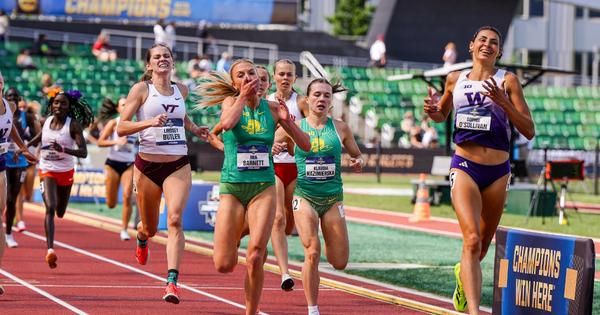
Women's 1500m Prelim - Heat Two / Photo by Audrey Allen / @audreyallen17
4:35pm – Women’s Pole Vault Finals
It was always going to be the Molls.
The twin sister duo from Washington of Hana and Amanda Moll entered the meet with the first and second best pole vaults in the nation. Amanda Moll held the outdoor collegiate record at 4.78m, set at the Big Ten championships, and previously cleared 4.91m indoors. Second to her sister in the past, Hana Moll cleared 4.81m indoors, but so far this outdoor season wasn’t able to clear 4.70m. Until today!
Both Hana and Amanda needed all three attempts to get over the 4.39m mark, but when Amanda faltered at 4.49m, Hana continued, eventually clearing 4.79m and grabbing the meet and collegiate record. The previous meet record holder, Chloe Timberg of Rutgers, needed fewer attempts to clear 4.39m and grabbed second place.
I didn’t realize it at the time, but Amanda currently holds the world lead with her indoor mark of 4.91m, and Hana sits in fourth with her 4.81m clearance. The sophomores from Washington are on a tear, and it’ll likely continue well into the summer.
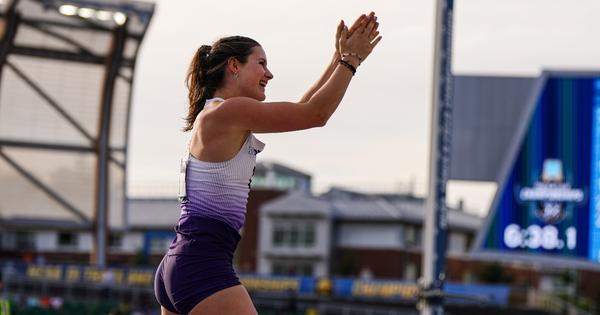
Hana Moll / Photo by Audrey Allen / @audreyallen17
4:38pm – Women’s 3000m Steeplechase Semifinals
From one event with a heavy favorite to the next. In this instance, the women’s 3000m steeplechase went pretty much according to the script.
Doris Lemngole of Alabama, the meet and collegiate record holder, won the first heat by a ridiculous 11 seconds. Lemngole’s personal best rests at 9:10.35, and ran her heat in 9:26.44. It took three personal bests to make it to the final three spots, with Northern Arizona’s Karrie Baloga, BYU’s Taylor Lovell, and Utah State’s Shelby Jensen all making the final through the auto spots.
The second heat was similarly predetermined—Angelina Napoleon of NC State and Lexy Halladay-Lowry ran side-by-side for what seemed like the entire race, separating themselves from the field with around three laps to go and finishing at 9:36.19 and 9:36.24, respectively. It once again took three personal bests to make the final three spots, run by Texas A&M’s Debora Cherono, Sarah Tait of West Virginia, and Maggie Liebich of Washington.
Liebich won the award for biggest fan club in this race, as the Washington 1500m trio of Amina Maatoug, Foerster, and O’Sullivan raced to the finish line to cheer their teammate on. It took an 11-second personal best by Liebich to make it into the final spot—and the cheers of “YOU DID
IT, MAGGIE” and “HELL YEAH, MAGGIE!” were well deserved.
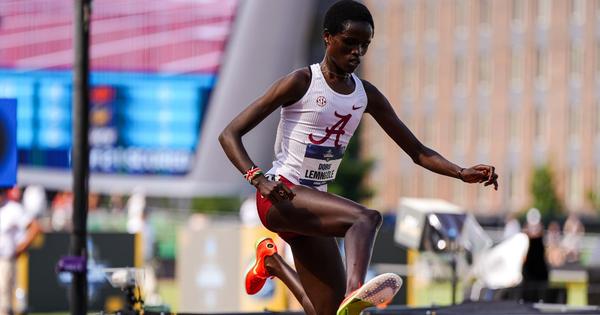
Doris Lemngole / Photo by Audrey Allen / @audreyallen17
5:08pm – Women’s 100m hurdles Semifinals
All qualifiers ran sub 13 seconds in the semifinals. The hurdles race was fairly straightforward with the biggest shock coming from Tennessee’s Myreanna Bebe getting DQed for “not hurdling each hurdle within the lane,” whatever that means. The Volunteer held the sixth fastest time in the nation entering the event.
It became the seventh fastest time after UCLA’s Yanla Ndjip-Nyemeck ran a personal best to end the qualifying with a time of 12.71. That time is currently second in the nation to Habiba Harris of Florida’s 12.62 run at the SEC Championships—and she also won her qualifying heat today as well.
I’m just glad there were no false starts in this race.
5:15pm – Women’s Javelin Final
If I had a nickel for every time a Missouri javelin thrower threw a three-meter PB to highly outperform their seed, I’d have two nickels. Which isn’t much, except that it is. Because, following on the heels of Callan Saldutto’s third place finish yesterday, Valentina Barrios Bornacelli won the title on a 3.8m personal best.
But to make it even more dramatic, even more magical, Bornacelli threw that personal best in the final round. She was sitting in fifth entering the final round, behind collegiate leader and favorite to win, Georgia’s Manuela Rotundo. Bornacelli stepped up to the plate and hit a ninth-inning-two outs-full-count HOME RUN, throwing 62.00m in her final attempt.
That was enough to hold first place and take the win by over one and a half meters. Hayward magic, indeed.
5:25pm – Women’s 100m Semifinal
Speaking of Hayward Magic…. WHAT IS HAPPENING ON THIS STRAIGHTAWAY?
The women’s qualifying times in the 100m, heading into tomorrow’s finals:
- Jameesia Ford (South Carolina) - 10.864, PB, Collegiate Lead
- Anthaya Charlton (Florida) - 10.866, PB
- Leah Bertrand (Ohio State) - 10.909, SB
- Tima Godbless (LSU) - 10.910, equaling her SB
- Samirah Moody (USC) - 10.922, PB
- Dajaz Defrand (USC) - 10.924, PB
- Brianna Selby (USC) - 11.01, PB
- Shenese Walker (FSU) - 11.057
- Victoria Cameron (Tarleton State) - 11.06
Last year, only two women had a qualifying time under 11 seconds – this year, it’s triple that number.
SIX qualifying times under 11 seconds. SIX OF THEM. Ford and Charlton just ran the second and third fastest wind-legal times in the WORLD this season. I keep writing in all caps because I WROTE IT DOWN in all caps, because this final is an ALL-CAPS KIND OF FINAL.
This stands to become the fastest women’s 100m final ever at NCAA Track and Field. I can’t wait to see what kind of times they throw down—the meet and collegiate record of 10.75 by Oregon’s Sha’Carri Richardson is still a bit far off, but I wouldn’t put anything past this field.
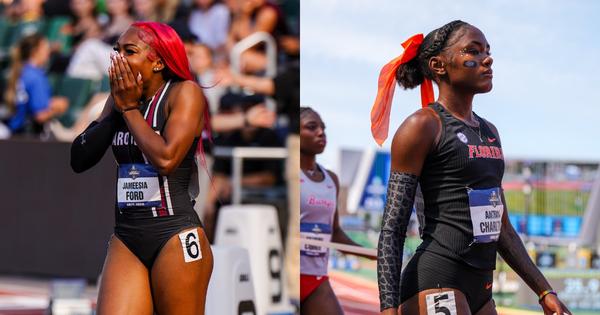
Jameesia Ford, Anthaya Charlton / Photos by Audrey Allen / @audreyallen17
5:40pm – Women’s Long Jump Finals
The long jump is easily the hardest event for me to see at Hayward Field. I’m constantly leaning forward in my seat to try and guess if the jump that just happened was an improvement or a foul or failed attempt. Sure, I could look at the video board, but then I’m looking behind me at the screen like I lost my parents somewhere in the top row of the stands. It’s hard to keep track of the long jump and its progression.
It was not hard to know what Louisville’s Synclair Savage jumped in her sixth and final attempt. A personal best and 6.72m leap put her two centimeters ahead of Stanford’s Alyssa Jones and Baylor’s Alexis Brown.
I could hear it from across the track. Hayward Magic struck again in the final round. For the first time all meet, I didn’t need to wait for the video board to load to see the final mark—I knew she won. What a clutch jump.
5:41pm – Women’s 400m Semifinal
A pair of Georgia Bulldogs, Aaliyah Butler and Dejanea Oakley, hold the top two overall spots going into the final round. These rounds were fairly straightforward—almost all the top sprinters made it through, and all ran under 51.50.
This race may have huge impacts for the team title, though, as Georgia is currently on pace to win the title. Having the two top runners in qualifying can do nothing but help their chances going into Saturday.
5:58pm – Women’s 800m Semifinal
Death, taxes, and LSU’s Michaela Rose taking out the first 400m of her 800m heats insanely fast.
She split a 56.86 for her first lap, leading the race wire-to-wire to win in a meet record of 1:58.95. The collegiate leader over the half-mile distance broke the 35-year-old meet record held by Suzy Favor in 1990, and said after her race she thinks it might take the collegiate record to win the final.
“I am so proud of this group of girls. We are a historic group coming in,” Rose added in the mixed zone. “I want to win it, but just being a part of that final is historic for me.”
Such is the depth of the women’s 800m right now. Sub-two minutes is expected to contend on the national stage, and sub-two was achieved four times in the heats. Lauren Tolbert of Duke finished second in her heat to Michaela Rose, running 1:59.39 and breaking the barrier for the first time.
Makayla Paige of UNC (GO HEELS) and Meghan Hunter of BYU also finished 1-2 in the second heat, each breaking two at 1:59.92 and 1:59.96 respectively. The third heat saw Roisin Willis of Stanford lead wire-to-wire, expertly controlling the race and winning in 2:00.33, with Veronica Hargrave of Indiana finishing in 2:01.54.
Smilla Kolbe of North Florida, Laura Pellicoro of Portland, and Victoria Bossong of Harvard all made it through on time—and the NCAA’s fourth fastest runner, Gladys Chepngetich from Clemson, didn’t make the final.
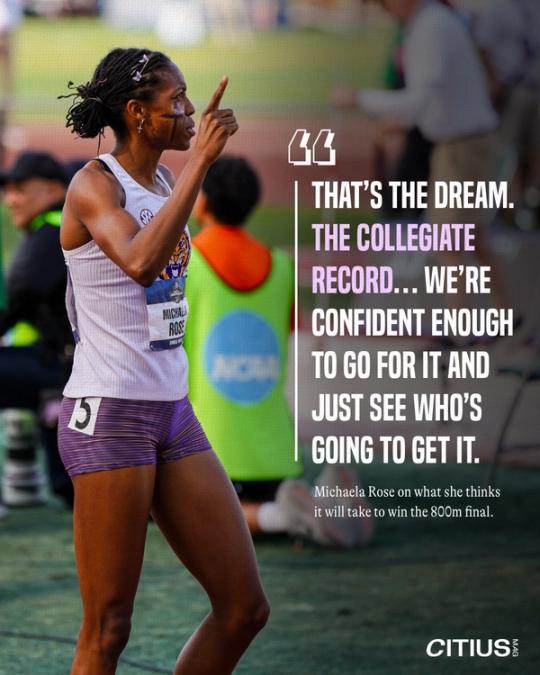
6:10pm – Women’s Shot Put Final
Mya Lesnar of Colorado State was the only women’s collegiate athlete over 19 meters this season for the shot put. She ends the season remaining the only women’s collegiate athlete over 19 meters this season.
Her first round launch of 19.01 meters was enough to win the title, with Abria Smith of Illinois throwing 18.85m to take second place and Nina Ndubuisi of Texas throwing 18.50m for third.
It wasn’t an extremely tense competition—Lesnar was far and away the favorite, and the crowd’s cheers represented that—but as we’ve learned so far at these championships, nothing is a given. The best in the nation continuing to be the best in the nation should be celebrated.
6:14pm – Women’s 400m Hurdles Semifinal
Speaking of the best continuing to be the best: Savannah Sutherland of Michigan laid waste to the field in a 54.13 qualifying time. Going into the finals, Sutherland is the favorite, especially after Arkansas’s Rachel Glenn scratched from the meet due to injury.
Akala Garrett of Texas is the only hurdler close to Sutherland’s season best of 53.46, as she ran a 53.73 in the same race at the Tom Jones Invitational back in April. Both won their heats, setting up a clash of the titans in the final race.
6:29pm – Women’s 200m Semifinal
JaMeesia Ford.
I was tempted to leave this section with just her name. Personal Best. Collegiate Lead. Sub-22 for the first time and improving her time as the fifth-fastest collegiate 200m runner ever. The 21.98-second run also slots her in at third in the world this year.
USC continues their sprinting dominance, as the trio of Moody, Defrand, and Madison Whyte all make it to the finals. Indya Mayberry of TCU, the freshman phenom and NCAA Indoor champion over 200m, failed to make it to the final in both the 100m and the 200m today—but still had a killer anchor on the 4x100m.
For those keeping track, this was also Ford’s third race of the day—and the third she finished first in the field. It’s shaping up to be a legendary final day for the South Carolina sophomore.
6:43pm – Men’s Decathlon 1500m Final
Nobody watches the Men’s Decathlon for their times. It’s the last event in a grueling ten-event stretch, and everyone is battling for their total point score.
15 of the 19 athletes in the final ran a personal best, but the best moment of the race had to be Kansas State’s Emil Uhlin kicking past UCOON’s Diarmuid O’Connor to win at the line at 4:22.46—an almost 10 second personal best over the distance. What a sprint. What a kick.
It’s even more inspiring when you know that Uhlin’s family came all the way from Sweden to support him, and were losing their minds at the finish line.
I had chills watching all the coaches sprint to the finish line to celebrate their athletes making it to the end of this stretch. Hugs, sweat, tears—all of the waterworks. Uhlin finished third overall, vastly outperforming his seeded 14th place. Brad Thomas of UCSB placed second overall, with a point total of 7,888.
And of course, Peyton Bair. The indoor heptathlon champion continued his winning ways in 2025, and grabbed his first outdoor national title as the first American-born man to win since 2012.
8,323 points, a collegiate lead and a personal best. 435 points clear of the rest of the field.
End scene.
6:56pm – Women’s 10,000m Final
I moved from my spot in the media zone to sit with the fans in general admission right before the women’s 10,000m race. I had to sit amongst the fans, because, well, I’m a fan. I’m a fan of track and field, and a fan of the 10,000m distance in particular.
I sat next to a man named Andy, all decked out in Atlanta Track Club gear. And we, along with a contingent of Arkansas and Georgetown fans, collectively lost our mind.
Grace Hartman of NC State started clicking off 74 and 75 second laps from the gun, coming through the 1600m mark only three seconds behind what the men ran last night. The lead pack went through the two miles faster than the men’s race, splitting 9:58.87 to Dylan Schubert’s 9:59.75.
It’s at that point we knew we were in for something special. Andy and I (and everybody in the general vicinity) were on the edge of our seats, watching Hartman continue to turn the screws on the field. The pack of seven at 4000m continued to whittle down, and by 5600m, Oregon’s Diana Cherotich dropped off what was, at the time, a three-person lead pack with Hartman and Pamela Kosgei of New Mexico.
I’m lucky that I saw this race in person. I’m lucky that I sat next to someone who could do the math on the splits and paces like Andy, and I’m lucky I wasn’t subjected to an advertising break in the middle of the race.
As Hartman and Kosgei continued to fly around the track at metronomic and methodical efficiency, we started to realize the meet record of 31:46.09, set by Parker Valby of Florida, was in sight.
And that meet record would go down. At a certain point, it became a question not if, but by how much.
With around two miles to go, Kosgei dropped a 72-second lap, immediately distancing herself from Hartman. Hartman continued to keep her pace, and the chase pack of Paityn Noe of Arkansas, Joy Naukot of West Virginia, and Chloe Scrimgeour of Georgetown continued to duke it out for third place.
Kosgei joined her New Mexico teammate in sweeping the 10,000m titles, winning in a meet record 31:17.82. Grace Hartman finished in second, running 31:32.15. Naukot finished in third with a PB of 31:34.34, scoring the fastest close of the race in a 68.96 final lap. Noe grabbed fourth in 31:36.91 (a personal best), and Scrimgeour ran 31:41.68 (also a PB).
The top five women all ran under the meet record set last year and did so in a way that was compelling every step of the way. It’s these races that remind me that the 10,000m is special because it gives time for storylines to develop. Not many track races are afforded that luxury.
It’s incredibly frustrating to hear that commercial breaks are frequently taken during these 10,000m races. Yes, yes, I know, not everyone loves watching people run 25 laps on a track. But if they heard the stories and they knew the stakes, it’s impossible to not get chills.
Andy told me he’s been to Olympic Trials and professional meets time and time again, but the NCAA Championships are always “the best meet ever.” I can’t help but agree: watching people run for a team, laying it all on the line in every event, is inspiring.
These meets lead to moments like Kosgei’s championship record and Bair’s national championship dominance, but they also lead to celebrations of humanity.
Uhlin, cheered on by his family who flew in from Sweden. Liebich of Washington celebrated for her huge PB, making it to the final—not just for herself, but for her team.
Meghan Hunter of BYU making the final of the 800m this year after breaking her neck in a car crash in 2019, miraculously persevering to continue her rise as one of the best 800m runners in the United States.
Ruth White, the ninth place finisher from New Hampshire, who stayed behind at the end of the 10,000m to offer words of encouragement and walk with last place runner, Josphine Mwaura of Oklahoma State.
This is what track and field is about. It’s more than the times. It’s more than advertisement breaks on major channels.
It’s more than paywalls. It’s more than the NCAA court ruling. It’s more than roster cuts. Track and field is, and will always be, bigger than what happens on the track and around it.
And isn’t that what sports are all about? You’re right Andy, this is the best meet ever. This is also the best sport ever.
I love it.
7:36pm – Women’s 4x400m Relay Semifinal
The women’s 4x400m relay had some fairly quick times to finish the day. Arkansas continued their 4x400m dominance with a 3:26.08, anchored by Rosey Effiong’s 49.46. Jameesia Ford ran her fourth (FOURTH) race of the day, anchoring the South Carolina women to a time of 3:27.95, winning their heat.
Ford split a 50.70 last leg, but easily could’ve run sub 50 had she not walked across the finish line, conserving as much energy as possible for what will be an equally-busy final day.
It’s going to be an unforgettable next two days of competition, and you better believe I’ll be on (or near) the front row, cheering my heart out.
___________________
Keep up with all things track and field by following us across Instagram, X, Bluesky, Threads, and YouTube. Catch the latest episodes of the CITIUS MAG Podcast on Spotify and Apple Podcasts. For more, subscribe to The Lap Count and CITIUS MAG Newsletter for the top running news delivered straight to your inbox.
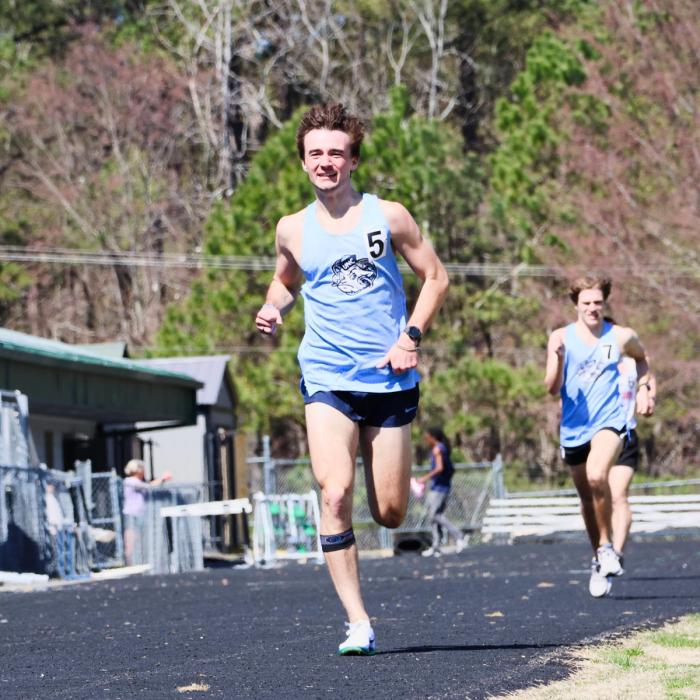
Keenan Baker
Keenan Baker is a track fan. He’s also a journalism major and writer at UNC-Chapel Hill. Putting both of those passions on the page together is the goal, and he looks forward to covering more track and field with CITIUS MAG this summer!
